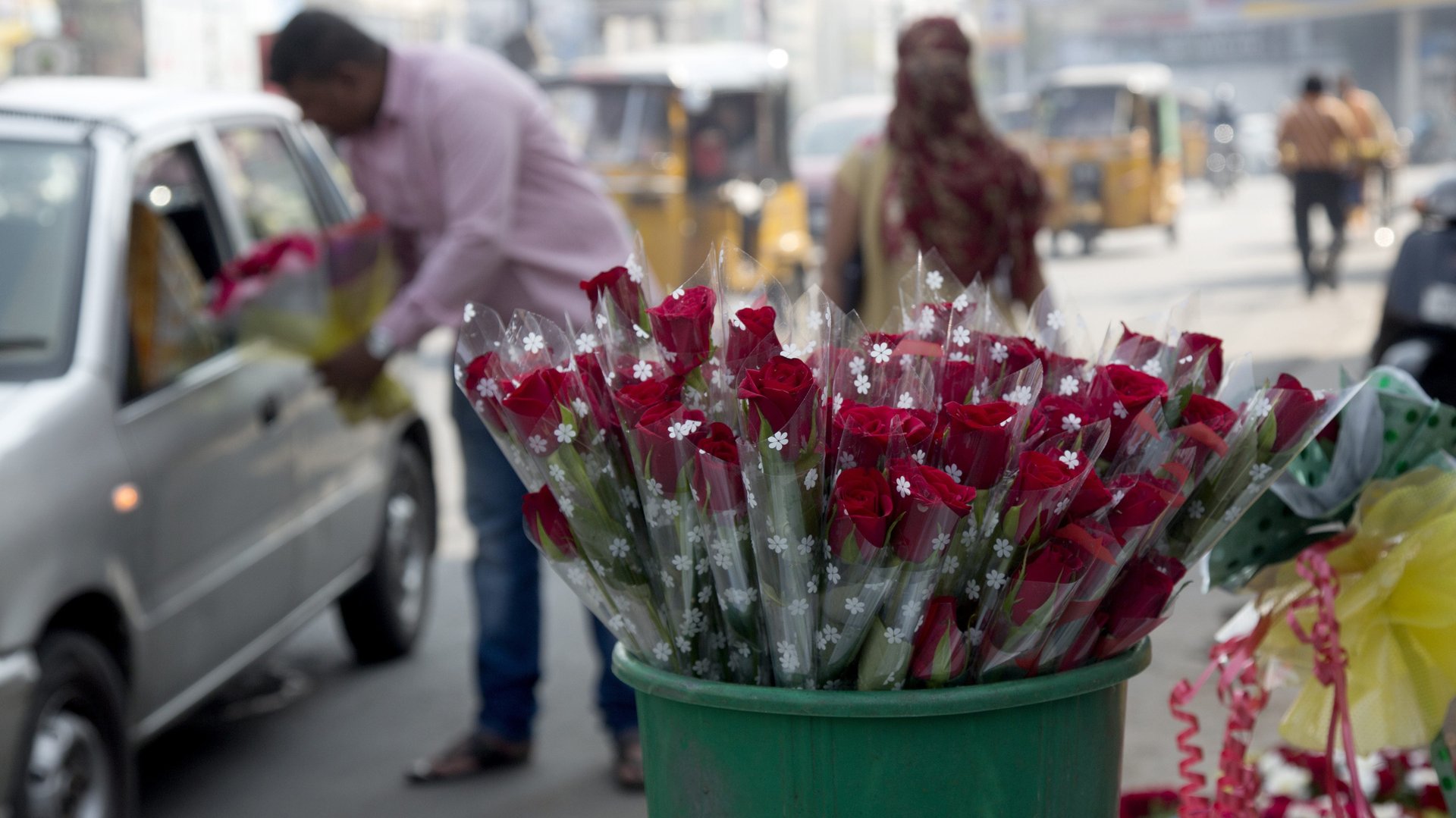On Valentine’s Day, the feminist, the lover, and the liberal in me go to war
I was nine years old when I discovered Valentine’s Day.


I was nine years old when I discovered Valentine’s Day.
I forget the exact circumstances, but it was Feb. 13 and it eventually led me to ask my parents what it meant. Without internet search engines, I had no option but to believe them—that it was a day to celebrate love. They carefully sidestepped that this love was romantic love. Obviously, sex was not even a blip on my radar.
I loved my parents and they loved me, so I demanded a gift. For a princely sum of Rs25 ($0.35), they bought me a gel-ink pen from a hole-in-the-wall stationery shop. I was ecstatic and thought this joy needs to be shared with everyone I loved. Mrs Neelakanthan, my favourite teacher, was on top of that list. So on Feb. 14, I walked into my classroom with a spring in my step, beamed at gentle Mrs Neelakanthan and wished her a very happy Valentine’s Day.
Here I must mention the reason why I loved her so. It was because she never screamed, wasn’t uselessly mean, and she taught me the easiest tongue-twister (which, in turn, made me feel extremely smart). But on Feb. 14, she glowered at me. “Do you even know what this day means?” I wanted the earth to swallow me whole. I slouched back into my seat, and my friend and I thumbed through our pocket dictionaries to Valentine’s. St Valentine? So, he was a saint? And if so, what was wrong in wishing my saintly, gentle, favourite teacher a happy Valentine’s Day?
Over two decades later and I wish I could go back to thinking Valentine’s was just a simple, uncomplicated expression of care, affection, love, friendship, warmth, companionship. Instead, today it’s about being a thinking adult avoiding the trap of capitalism, oddly rebelling against an oppressive Indian society that won’t let you express love, while also feeling disastrously lonely when the world around you is one giant, pink teddy bear.
A battle for principles
As a college-going, partner-less adult, Valentine’s had a whole different meaning. I was a budding feminist, so I didn’t need no man buying me flowers and chocolates. We were a group of bold, albeit too giggly, young women with bright minds and disruptive social ideologies.
Why should Indians celebrate Valentine’s at all, we wondered in a post-colonial literature class. When Saadat Hasan Manto wrote of two lovers in the throes of passion, or when Ismat Chughtai wrote Lihaaf, were they thinking about these foreign, cultural imports? What more could St Valentine add to the riveting Heer-Ranjha folklore?
So I denounced Valentine’s with all my might. But a day before, I would read confounding news items about right-wing groups in India threatening to accost young lovers on this day of love. That would lead me to profess that every human being should celebrate love the way they wanted to. I would not be seen dead with a heart-shaped card in my hand, but I would defend to death others’ right to receive and cherish theirs.
Such was—and still is largely—the peril of being young lovers in India. In case you were found to be in a relationship before wedlock, gently oppressive parents would threaten you with several days of curfew, and abusive oppressors like right-wing groups would threaten violence.
A close friend’s parents were of the former category. So, as a 21-year-old single woman on Valentine’s Day, I had simply one job—to chaperone friends on their date on Feb. 14. I was recently single, heartbroken, and yet, surrounded by two very in-love young people, red balloons, and bubbles. I think there was music, someone was eating cotton candy, and there was glitter on my hands after holding greeting cards doused in that shiny nonsense.
Cupid seemed to have barfed up in pink all around me. Yet I soldiered on because everyone must be allowed to love.
Mind games
The years that I was in a steady relationship, Valentine’s was a battle of egos. Should I say I’m that girl and tell him I want to go out on a date on Feb. 14? Did he just refuse to meet me because it was too cold? Oh wow, did I really just bake this batch of banana walnut muffins for him? John Keats, seriously? Are you seriously gifting him a book of poems? So how should I tell him that I would appreciate a bag more than wretched red roses?
For nearly a decade, Valentine’s was a little about “he loves me, he loves me not.” It was also, in equal parts, about “I want to be loved, but I don’t want to make a big deal about it, though I secretly do.”
In 2020, Valentine’s is about all those things and more. As adults with demanding careers, my friends and I couldn’t care less about finding a date just for this day. The thought that there are apps and the possibility is endless is exhausting more than reassuring.
I would rather hole up, wait for the day to pass, and wake up on Feb. 15 like nothing happened. There’s so much pressure to be joyful about love, and so much internal conflict to avoid giving in to the trap of this capitalist, greeting-card industry spurred holiday. I’d love to be clichéd for once, but loathe to find myself in a clichéd mushball situation. What follows this mental soliloquy is a liberal portion of feeling like a square peg in a round, perfectly coupled up world.
In 1967, The Beatles sang “All You Need is Love.” To that I’d like to add, as my colleague Annalisa Merelli wrote, “All you need is to love and be loved.” Preferably beyond Feb. 14 as well.
We welcome your comments at [email protected].